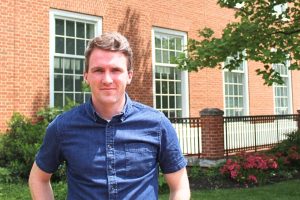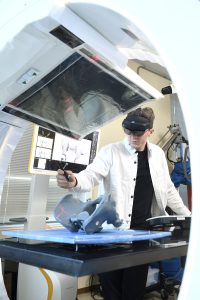
Benjamin Killeen, a fourth-year computer science PhD student, has been named a recipient of the Link Foundation Fellowship in Modeling, Simulation, and Training in recognition of his achievements and research on simulating technology-assisted operating rooms.
The Link Foundation supports programs to foster the theoretical basis, practical knowledge, and application of energy, simulation, and ocean engineering and instrumentation research. The Foundation’s Modeling, Simulation, and Training Fellowship Program was established in 1991 to support doctoral students studying in the simulation and training field; awards consist of a one-year fellowship of $34,000 with the potential for an additional year’s extension.
Killeen’s research centers on intelligent surgical systems that improve patient outcomes; his recent work involves the realistic simulation of interventional X-ray imaging for the purpose of developing AI-integrated surgical systems. He is a member of the Advanced Robotics and Computationally AugmenteD Environments Lab under the direction of Mathias Unberath, an assistant professor of computer science.
The Link Fellowship will support Killeen’s research on simulating the future of work in AI- and robot-assisted operating rooms via “digital twins.”
“Robots and AI are rapidly changing the nature of work,” he says. “The modern operating room is no exception, as medical robots disrupt existing workflows and introduce new capabilities. They have enormous potential to benefit patient outcomes, improve operating room efficiency, mitigate occupational risk, and broaden access to the highest standard of care.”
However, AI assistance systems often involve complicated setup, calibration, and deployment workflows, and surgeons and stakeholders may be reluctant to adopt such unfamiliar technology—especially with limited opportunities to learn on the job.
“At the moment, surgical robots are only used every once in a while,” explains Unberath, Killeen’s advisor. “How can we make sure that providers and staff remember safety-critical steps when using these complex systems, even if their formal training or their last surgery performed with the system was weeks ago?”

Image Credit: Will Kirk/Johns Hopkins University
As an answer, Killeen is developing an interactive simulation called a “digital twin”: a virtual representation of a real object—like an operating room or a patient—that reflects how that object looks and behaves in real life. His digital twin operating room will reflect the appearance and constraints of a real OR as a procedure plays out, enabling trainees to step into any role during the interactive playback of both real and planned surgical procedures. In this fashion, surgeons can build confidence in their interactions with human-in-the-loop AI and robotic surgical systems through near-real-world experience and even “jump in” to a practice procedure for a refresher before conducting a live surgery.
To evaluate the digital twin OR’s effectiveness, Killeen plans to collaborate with Greg Michael Osgood, an associate professor of orthopaedic surgery and an attending surgeon in the Johns Hopkins Department of Orthopaedic Surgery, to develop an example workflow for a radiological technician during orthopaedic surgery.
“As a sci-fi fan, I’ve always been interested in the role of AI in the home, the car, and the workplace,” Killeen says. “But the Link Fellowship will enable me to research AI in the modern operating room; support from the Link Foundation will enable a year-long commitment to the development of a robust surgical simulator for image-guided procedures.”
Killeen will be developing generative patient models this summer to support this research project. He also currently serves as the president of the Laboratory for Computational Sensing and Robotics Graduate Student Association and is a member of the Medical Image Computing and Computer Assisted Intervention Society student board.